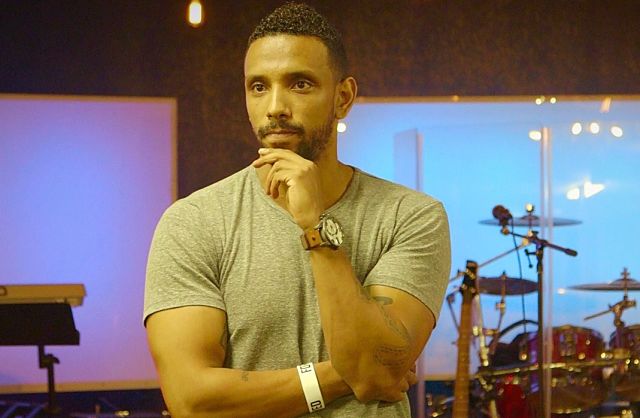 Messay Getahun is the director of the film 'Lambadina.' (Courtesy photo)
Messay Getahun is the director of the film 'Lambadina.' (Courtesy photo)
Tadias Magazine
By Tesfaye Mohamed

Published: Wednesday, May 25th, 2016
New York (TADIAS) – The film Lambadina, directed by Messay Getahun, features 9 year-old Joseph who is abandoned as his father, Solomon, flees Ethiopia during the civil war. Nonetheless he eventually finds refuge in a home and grows up to fall in love with the daughter in the new family (Ruth), and eventually emigrates to the U.S. The film takes us from Addis Ababa to Los Angeles, and shows the resilience of a young man overcoming various obstacles in life.
Screened at the Pan African Film Festival, Lambadina, is scheduled to be released in theaters in Fall 2016.
The film’s director, Messay Getahun, was born in Addis Ababa and raised in Dallas, Texas. He attended Texas Tech, studying computer graphics as well as human sciences and Family Studies. Subsequently he moved to California. Lambadina is Messay’s first full feature movie in which he wrote, directed, produced, edited and sound designed. Lambadina is the work of three crew members. The other two include Justin Dickson (Director of Photography) and Hermon Tekle (Camera and Sound Operator).
Below is a Q&A with the Director of Lambadina, Messay Getahun:
Tesfaye Mohamed: Did you have in mind what your first movie would be about, was there a particular story you wanted to tell?
Messay Getahun: Justin — who works as a DP & Lighting Gaffer in TV shows and feature films in Hollywood — and I have always dreamed of a day where we would make a feature film with a solid content. Media is a powerful tool with an immeasurable impact. Much of the content I often saw wasn’t necessarily positive. Especially when it comes to the representation of Ethiopia and Africa. Every film that comes out of Africa that makes a splash is often coated with the “white savior complex.” It’s a narrative that makes the West look good while on the other hand demeaning Ethiopia or Africa. My heart wanted to tell a different narrative — a contemporary narrative film. An Ethiopian Film for a Western audience. If there is a message, I wanted it to be about life. We wanted to make real life movies. Stories that are honest, real, entertaining and satisfying to the souls of the viewers. In 2011 I decided to save money to start purchasing production equipment needed to produce a quality film. It took me two years to finish writing the script. We wanted to make a universal film. Something the older generation, the younger generation, Africans and non-Africans could watch. Finding a good balance was essential.
Tesfaye: So the movie credits state that it’s based on a true story. Can you say more about that, and whose story is it based on?
Messay: It actually says “based on true events.” Yeah, beginning part of the film has an element of true events. It’s a story of a split that happens between a father and son during uncertain times in Ethiopia. That portion of the story is actually my personal story. My dad was involved in politics. I was about 6 years old and a new government was coming to power, so I based the story from some childhood memories I had of an era that I thought was important for the source of the film.
Tesfaye: Now let’s talk about the name, The first thing that came to my mind when I saw the title was “Teddy Afro’s” music Lambadina, Does it have any relation with the song?
Messay: [laughs]. I do often get this question. I chose the title because of its meaning. Lambadina is an Ethio-Italian word which means “lantern“ or “night light.” The definition represented the theme of the film. The film is about overcoming the obstacles that life throws at you. Life is not always going to be bright and sunny, but our perspective and how we handle those dark moments can be our “LAMBADINA.” I also wanted a one-word title. Something foreign enough but yet easy enough to pronounce for the western audience.
Tesfaye: You shot part of the film In Ethiopia, can you tell me the locations used. Was it all in Addis or was it also shot in other parts of the country?
Messay: All of the locations in Ethiopia were in Addis Ababa.
Photos of scenes from the movie ‘Lambadina’, provided by the director Messay Getahun.
Tesfaye: How long did it take to finish the film?
Messay: We started shooting the film at the end of 2013. We went to Ethiopia and filmed the Ethiopia scenes first. We took a 6-month break for a number of reasons and we started shooting the U.S.-based scenes in late 2014. It took me all of 2015 to edit the film. Once the editing was done, I had to color grade the film, do the music mix, and finalize the subtitles.
Tesfaye: Did you have to ship in equipment from outside the country or did you find everything you needed?
Messay: I was given a filming permit to film in Ethiopia so it made everything easier to bring in our own equipment with us.
Tesfaye: Can you tell me about the budget, about the crew, how many people were involved in the making of the film, and were they Ethiopians and local residents?
Messay: The entire film was self funded. No outside funding was used, nor did I do any crowdfunding. The entire film was also done by 3 crew members which is astonishing when you think about it. When we mentioned this fact during a Q&A at the Pan African Film Festival there was a gasp among the audience. Many executives and jurors from the festival couldn’t believe it. Myself, Justin, and Hermon were the only individuals who worked on the film. Justin was the DP & Chief Camera Operator, Hermon was the Sound Operator and sometimes the Camera Operator. We rotated responsibilities as needed. I would direct and sometimes Justin would be the acting coach, other times Hermon would be the DP. We would work 19-hour shifts. Can you imagine a three-man crew doing all the work in Ethiopia? It was nuts. We would get up at the crack of dawn, load equipment, drive to the location, set up, do scene blocking, coach the actors, pack up, go to the other location and repeat the process. It was the hardest thing I have ever done, but it made every minute worth it because I was working with people whom I loved and shared the same vision with. The actors in the film were mostly my friends who I knew had a passion for storytelling. I just asked individuals whom I thought would play the character well. Even the little kids were amazing. They were coachable. We did use two professional actors from Ethiopia — Hanan Obid & Seyoum Tefera were recommended to us through a good friend who worked in the film industry in Ethiopia.
Tesfaye: You premiered the film in Ethiopia first. Can you share more on how it was received?
Messay: The premiere in Ethiopia was fantastic. It was a private screening held on the campus of ICS. Michael Yimesgen who plays the “Solomon character” was in charge of putting together the Addis screening. Many people from the diplomatic circles and arts circles were in attendance. About 500 people attended the invitation-only event and it was received with a standing ovation. The screening was featured on EBS on their “Semonun Addis” segment. The trailer has gone semi-viral in Addis. We would get stopped everywhere we went. The demographics of the audience is what really made me happy. Older people, younger people, Ethiopians and non Ethiopians alike kept giving us incredible reviews.
Tesfaye: Was it premiered anywhere else? I know that it will be shown at The San Francisco Black Film Festival in June.
Messay: We are headlining the festival in San Francisco. The world premiere of the film was held at the 2016 Pan African Film Festival held in Los Angeles. We were the only film to have gotten sold out screenings in all our 4 screenings. Due to popular demand, there were additional screenings as well. We were also honored to receive the Audience Award for Narrative Feature as well as Special Jury Recognition-Director for First Feature Narrative at the 2016 Pan African Film Festival. We plan to do our own screening of the film in various cities including in Toronto during the Ethiopian Soccer Tournament as well as in Washington DC, Dallas, Seattle & New York between July & September. The U.S. Embassy in Ethiopia is also hosting an Ethiopia premiere of the film at the National Theatre in Addis Ababa sometime during this summer. Our goal is to get a distribution deal. Either a theatrical release or a Video on Demand deal would be ideal. Yes, Netflix is likely once we are done running the festival circuit, the theatrical screenings and the inflight entertainment features.
Watch below the official trailer for ‘Lambadina’ [HD]:
—
You can learn more about the film at www.lambadinamovie.com.
About the Author:
Tesfaye Mohamed is a second year law student at North Carolina Central University School of Law. His interests include Civil Rights Law, Constitutional Law, Employment Law, and Contract Law. Tesfaye was born in Ethiopia and grew up in the United States.
Related:
How DC Native Kenny Allen Moved to Ethiopia
Join the conversation on Twitter and Facebook.

























